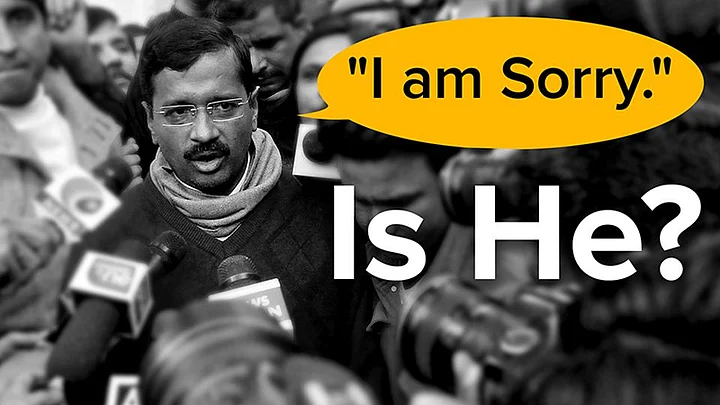‘Sorry’ seemed to be the hardest word for Indian politicians before social media stormed onto our smartphones. Facebook and Twitter have given us the space to vent about our politically incorrect netas, who have now realised they can’t just ignore us.
The ‘S’ word in fact did wonders for Arvind Kejriwal who had an epiphany just three months after his infamous 49-day stint as CM. Delhiites accepted his apology which was played ad nauseam on radio as part of a genuinely apologetic-sounding election campaign. Kejriwal had resigned abruptly over a tussle with the Centre over the Lokpal Bill and there was palpable anger against that decision.
But three months later, people were a lot less forgiving when the Delhi Chief Minister sought to apologise for continuing his speech despite a farmer committing suicide at his political rally.
Name & Shame
More recently, Ram Madhav overstretched himself when he questioned Vice President Hamid Ansari’s absence at “Yogapath”. Within minutes, Ram Madhav deleted his tweet, apologised and clarified that the Vice-President could not attend the International Yoga Day celebrations because he was unwell.
The truth emerged when Hamid Ansari’s office issued a statement, saying that he had not been invited. The government issued a half-hearted apology, but justified its decision of not inviting Mr Ansari. Apparently, Prime Minister Modi could not have been the chief guest at the function being attended by the Vice-President since “he is ranked above the prime minister in the order of precedence”, according to Ayush Minister Sripad Naik.
When Does an Apology Work?
Journalist-turned-advertising professional Preet Bedi says an “apology works only for those who have residual credibility”.
If you listen carefully, they’re not really apologising. They say something to the effect of “ If I hurt you, I’m sorry” which does not take away from the fact that “I meant what I said”.
– Preet Bedi, MD, The Dinner Table Advisory
This could perhaps explain why an apology worked for Arvind Kejriwal the first time around and got him elected to government with an astounding 67 MLAs in the 70-member Delhi Assembly.
Nitish Kumar also quit as Bihar Chief Minister mid-term and took moral responsibility for the JD(U)‘s poor performance in the 2014 Lok Sabha elections. He sought to reorganise the party cadre by freeing up his schedule as CM. What followed was a game of political oneupmanship with his own appointee, Manjhi.
But will “sorry” work for Bihar’s Nitish Kumar? The answer to that will become apparent towards the end of the year when Bihar goes to vote.
Speaking to The Quint, Coomi Kapoor recalls Indira Gandhi expressing regret for the forced sterilizations during the Emergency. But even for a mass leader like Indira, there was no immediate absolution. The Congress lost 197 Lok Sabha seats in the 1977 General Election. Indira and her son Sanjay Gandhi could not even retain their constituencies.
Indian politicians are not really in the habit of being repentant or saying sorry for their past misdemeanours, genuine or perceived misdemeanours. I can think of Indira Gandhi and Vidya Charan Shukla publicly saying they were sorry for the “excesses” committed by a few of her supporters during Emergency.
– Paranjoy Guha Thakurta, Senior Journalist & Columnist
The media, as a rule, tends to construe an apology as an admission of guilt and views an expression of regret with cynicism.
Perhaps that explains why Sonia Gandhi and Narendra Modi have not issued an explicit apology for the 1984 and 2002 riots.
(At The Quint, we question everything. Play an active role in shaping our journalism by becoming a member today.)
